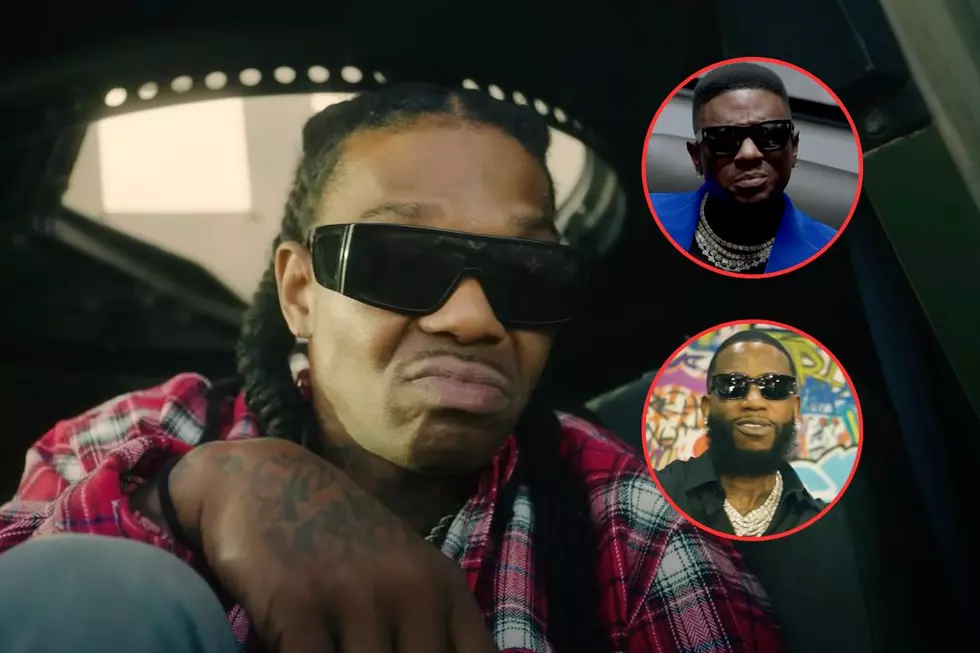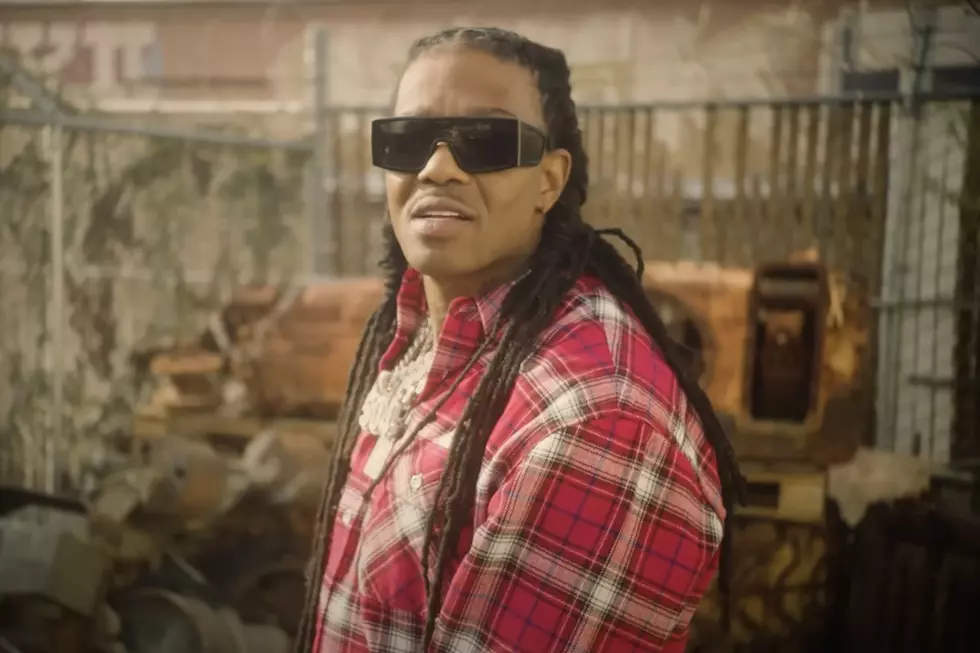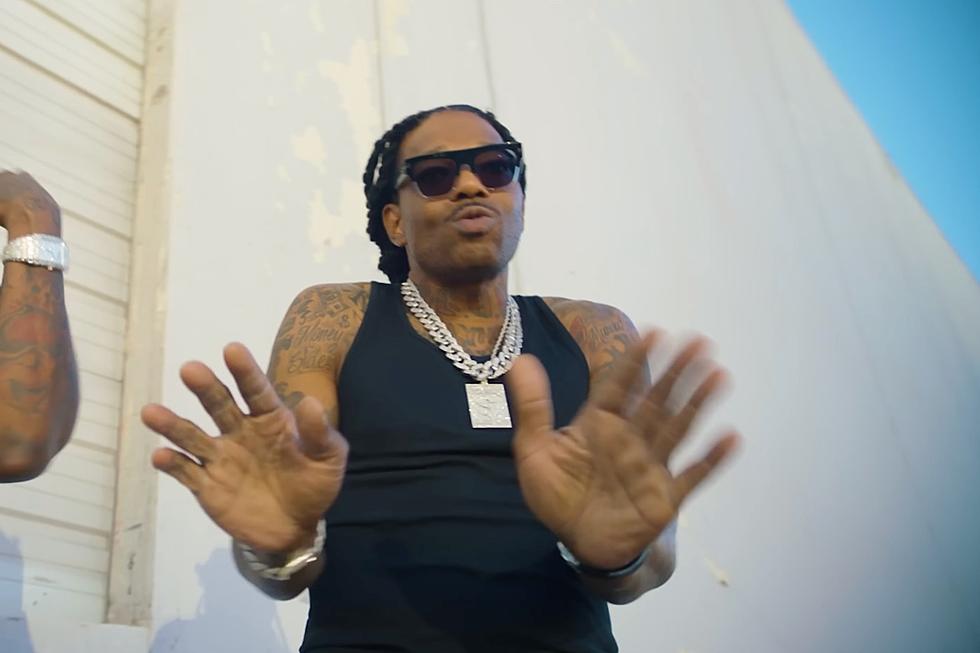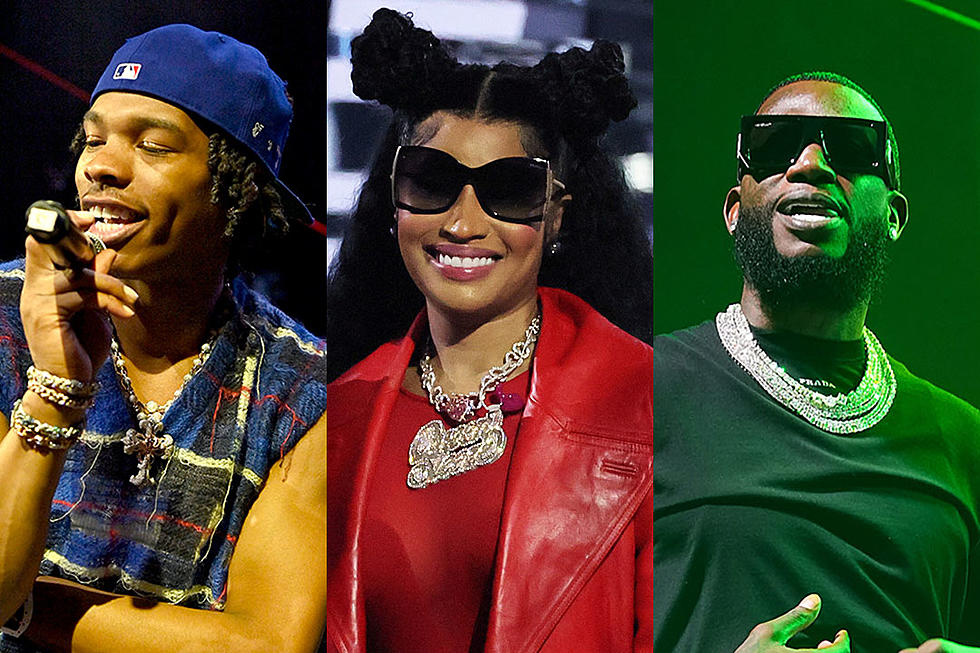
B.G., “Long Time Coming” (Originally Published December/January 2013)
B.G. starts a fourteen-year bid behind bars.
Words: Brendan McCarthy
THE 32-YEAR-OLD MAN SHUFFLES INTO THE VISITING BOOTH AT FCI BEAUMONT MEDIUM, PART OF THE BEAUMONT FEDERAL CORRECTIONAL COMPLEX, ON AN OCTOBER AFTERNOON. HE’S SLOW, banged up, recovering from a broken foot in a prison basketball game. He shows other signs of mortality too: A dash of gray in his shoulder-length twists, an extra 15 pounds or so on his frame, an orange jail jumpsuit.
Christopher Noel Dorsey, inmate No. 31969-034, convicted of gun possession and witness tampering, is the son of a murdered man; the child of a broken home. He is a former drug addict. He pays his child support on time. He repents to God for his demons.
But you know him as B.G., short for “Baby Gangsta,” celebrated star from the nation’s most murderous city. His rhymes are a warning on how to get by on New Orleans’ streets: Shooting, slinging, never snitching.
While his ol’ running buddies and rap mates—at least the ones still alive—are out making music videos, banking millions and living the dream he thought he could have, he sits behind this window. His words spew not through club loudspeakers, but through a tiny metal slot fi t for a corner store cashier.
He slides into a cheap plastic chair and pushes his sleeves up past the track marks and tattoos. He’s got this look—part sneer, part grin—like he knows something you don’t; like he successfully pulled one over on you.
“What’s happenin’?” he asks.
What’s happening is this: In July, B.G. was sentenced to 14 years in federal prision following a tumultuous career and years of drug addiction. His legecy is complicated, to say the least, but secure since he didn’t snitch. Things didn’t have to end this way, though.
****
Dorsey started rapping around the time someone shot his Dad dead in 1992. He spat his anger in verse and fell in with Cash Money Records and its’ bosses, brothers Bryan “Baby” and Ronald “Slim” Williams. The New Orleans-born brothers became B.G.’s first managers and record label bosses. But they were more than that. “Baby was my father figure; raised me from a boy,” he says.
Dorsey’s first offi cial venture into rapping was as part of Cash Money’s The B.G.’z. At 15, he was the bigger, meaner half of the duo, which partnered him with a precocious pal named Lil Wayne. Soon, the pair joined Juvenile and Turk to form the Hot Boys. They charted on Billboard, toured the country, drove fast cars, entertained easy women, and dominated late 1990s hip-hop.
But while the world moved fast, Dorsey was still a kid from the ’hood. At 15, one of his boys, a dope addict named Doody Cone, was shot dead. Dorsey snorted a bag of heroin in his honor. It was his first taste; the start of a spiral.
“Everythin’ seemed right,” he remembers. “I was seein’ so much money, gettin’ money, things were great. I never had to rob a nigga to get loaded, ya know? It was easy.”
At 16, he was arrested with crack and marijuana. A year later, pills and pot, with more serious crimes on the horizon. “One minute, I was Christopher. The next, I wasn’t. I wore too many hats,” he says from behind the jailhouse window, dirty with smudged fingerprints. “In a way, I threw it all away for all that street shit. I fucked up, yeah.” But not before achieving worldwide fame with a string of hits, including “Bling Bling.”
By 2002, B.G. had parted ways with Cash Money after a financial dispute with Baby and Slim. He stepped out on his own creating his own label, Chopper City Records, in 2001 and signing a deal with Koch Records (now eOne Music). But despite the positive changes in his life, B.G. was still battling drugs. A police report notes that offi cers spotted him, half-hanging out of a GMC Yukon, the driver’s side door open. He was “looking down, holding a hypodermic needle, preparing to inject…” He pulled out, tossed the needle to the floor, where the New Orlean’s Police Department found heroin foils, cocaine and a blunt. The officers wrote in the report that Dorsey had “burnt veins” on his arms, a side eff ect from shooting heroin.
There was a trip to rehab in Minnesota. Didn’t work. A rehab stint in Los Angeles; no good either. His lawyer and a local judge went out of their way and steered him into a court-ordered drug treatment program around 2003. Dorsey kicked the heroin habit but replaced it with methadone.
He made business associates in Detroit and began to travel back-and-forth between The Motor City, where he was trying to refocus, and the Crescent City, where he was building his own label. “You know, Cash Money, I carried it on my back,” he says. “I figured if I could make millions for them, I could do it for myself.” But problems followed him North. In December 2005, Dorsey was arrested in Detriot for driving with a suspended license and carrying a concealed weapon—a gun that had been stolen from the New Orleans Police Department. Within days, another arrest. A passerby found Dorsey in his car, apparently unconscious. Cops found a gun and marijuana in the car. And two months later another arrest, this one for possession of marijuana, a handgun and body armor. Detroit court records show he still has an open arrest warrant there.
Around 2006, while B.G’s city lay in tatters from Hurricane Katrina, and after several successful years with Koch Records (he dropped four solo albums and two Chopper City compilations with the indie giant between 2003 and 2009), B.G. inked a deal with Atlantic Records—one that reportedly came with an $800,000 advance. He began recording his eleventh solo album, Too Hood 2 Be Hollywood, executive produced by T.I., which wouldn’t be released until December 2009. At the same time, he also got addicted to pills: Lortab, Percocet, Soma, Xanax, and cough syrup with codeine.
Behind the bravado, the drugs and pills took their toll. A couple seizures put him in the hospital. In online videos and interviews, there’s the slurred speech, the habit of repeating every other sentence—a half-conscious swagger that’s become something of his calling card.
“His style, his swagger, everything he rapped about, he lived,” says Chopper City’s 13th Jigg. “Some rappers make things out to be a fairytale. But not him. He lived it. He embraced it.”
At the time, it seemed simple. Show up, preach what you know, enjoy the ride. Money, cash, hoes. The streets of New Orleans stayed bloody, the dope game busy. More material for rap songs.
“I know y’all think that I’m ignorant, I’m just a gangsta for real,” he raps on “Guilty By Association,” his 2010 song based on his federal case. “This is chess not checkers, I’m a thinker for real.”
For years, the so-called Hood General, the self-proclaimed Heart of the Streets made it clear: This is real, this is me, this is gospel.
Unfortunately, the authorities felt the same way: It was real, non-fiction, and illegal. “The gangsta as a counter culture hero is a pathetic myth,” says U.S. Attorney Jim Letten, the man who would eventually put B.G. behind bars for a long time. “These guys who live these lifestyles, who live to kill and deal drugs, basically live like dogs. They live in fear. They hide. And they end up in jail or dead.”
On November 3, 2009, he was in the back seat of a stolen Chevy Tahoe with two members of his entourage in the front. The cops pulled them over, and then pulled three pistols and a bottle of pills from the truck. Demounde Pollard, 18, told the officers that the guns were for protection, since someone had recently tried to jack Dorsey “outta his jewelry.”
Dorsey remained free while his co-D’s sat behind bars—a lucky break for him, it seemed. But it would prove his downfall.The other two called him from the jailhouse phones, routinely screened for confessions of crimes and other prosecutorial bait. As the feds listened in, it eventually became clear: Dorsey and his friend, Jerod Fedison, had pressured Pollard to sign a false affidavit taking ownership of the guns. Dorsey distributed cash and arranged for Pollard to get out on bond. Pollard eventually pleaded guilty, as did Fedison. By then, a pattern had developed.
The Bureau of Alcohol, Tobacco, Firearms and Explosives (ATF) realized a similar scenario happened months earlier. In June 2009, an aspiring rapper from Houston, Kentrell Washington, got caught with Dorsey and another man in a car in New Orleans. Cops found weed in the car and a gun under Dorsey’s seat. Washington pleaded guilty, took his charge and got a lengthy sentence. An unknown donor paid for his attorney, the same one that had previously represented Dorsey.
Years later, Washington wrote to the judge, swore the gun wasn’t his, and that he got aligned with lawyers who didn’t have his best interest at heart. But it was too late.
Since 2009, the fed’s investigation expanded. Within the many jail calls recorded by the feds, Dorsey allegedly plotted a murder with his partners.
During one call, according to court fi lings, Dorsey talked about how he and a man named Walter Porter tried to shoot down two foes in a drive-by. Porter replied that Dorsey was too messed up on drugs, his reactions too stunted. Had he slowed the car, he said, Dorsey could have been killed by retaliatory fire. Porter wanted to make sure his longtime pal would live to rap another day.
Dorsey’s connections to Porter and other local gangstas became an issue in court. Prosecutors, lobbying for an increased sentence, showed the judge video posted to YouTube in 2009 in which Dorsey looks into the camera and touts his love for the city’s most well-known killer. “Free my nigga, Telly Hankton, ya heard me. One of the realest niggas in the city.”
Hankton, convicted of one murder already, was indicted in late October with 12 associates, including his mother, in a sprawling federal racketeering and conspiracy case—the kind used to prosecute large gangs and the Mafia.
The indictment portrayed Hankton and his family as the biggest, most violent group the city has seen in decades. Federal investigators said they moved hundreds of kilos of cocaine, heroin and marijuana. They allegedly were behind several killings.
Hankton’s murdered cousin, George “Cup” Hankton, was legendary in New Orleans. A well-known reputed drug trafficker who was arrested but never prosecuted in connection with three murders, Cup was closely aligned with Cash Money co-founder Baby and several rappers, according to a police report and other sources. Cup’s killing in 2007 prompted Telly to kill the supposed shooter.
Telly Hankton’s supposed hitman was B.G.’s pal and jail call confidante, Walter Porter. Porter allegedly took $10,000 to kill a witness set to testify against Telly Hankton. Federal agents said Porter tried, but failed, and ended up killing that witnesses’ brother.
In the video, Dorsey talks more of Hankton. “They hating on him right now. You know what I’m saying, they got him all over the news and shit, ya know. Witnesses come up dead and shit. Man in jail. He post a million-dollar bond. Now they don’t want to give nigga another bond because they know the man gonna make the bond.”
At this point in the video, Dorsey turns from the camera and shouts to Porter, who is sitting nearby in a truck.
“Say, Moonie,” Dorsey shouts to his friend by his nickname. “You know what it is baby, you heard me, it’s all good in the ’hood.” Porter grins and yells back. “Free my dog Telly,” Porter says. “Let him go. Y’all can’t stop him. He didn’t do it!”
From behind the glass, Dorsey shakes these connections off . He says he and Porter grew up together and remain close. As for Telly Hankton, “We knew each other from the neighborhood,” Dorsey says. “But that’s it.”
Dorsey says it’s no big deal; that New Orleans is a big city but like a small town. “Lots of people know lots of people.” He says the media has blown this up.
What remains clear, but unspoken, is that federal agents would have loved Dorsey to tell them all about Porter and Hankton. But just like in his verse, Dorsey didn’t snitch, didn’t tell. In fact, he didn’t cooperate at all, and ended up taking a guilty plea without any type of plea deal or agreement.
Ask Dorsey about jail, and he brushes it off . “It’s really a small thing to a giant,” he’ll say.
But that doesn’t quite jibe with the letters he wrote to U.S. District Court Judge Ginger Berrigan earlier in 2012, while staring down decades in prison on gun and witness tampering charges. “The prosecution is using my career as a rap artist to paint a picture that I am the image that I portray in my lyrics as my real life story,” he wrote. “Which is not he case by far. I’m not insinuating that I’m a perfect person, but I’m definitely not a gangsta.”
His attorney says this is posturing. He says the songs are art, and only art. Johnny Cash didn’t shoot a man in Reno just to watch him die. Bob Marley never shot the sheriff .
“These stories that I author are pictures that I paint and are really just a fi gment of my imagination,” he wrote. “I am an entertainer, that’s my job. Everything I rap about is not necessarily true or about me. I rap about whatever I think will sell. My music does not defi ne me as a person.”
That’s what Christopher Dorsey said to the judge, but in a letter to fans posted on his website a few months later, he wrote, “DAM IT FEELS GOOD 2 BE A GANGSTA.” And issued a reminder: “it’s DEATH BEFORE DISHONOR. Like I say, DON’T RAT, DON’T SNITCH, DON’T BEND, DON’T FOLD. To my street niggas if Nobody TALKS, Everybody WALKS. Remember that if you are ever in a JAM.”
The feds don’t care to differentiate. Prosecutors introduced Dorsey’s music videos in court in an eff ort put him in prison for as long as they could.
His big charge—being a felon in possession of a fi rearm—is based largely on his lengthy list of previous convictions. Probation officers recommended to the judge a sentence of eight to 10 years in prison.
Prosecutors wanted more. “He is living, making money off the blood of young Black men,” said prosecutor Maurice Landrieu. “Why would a community celebrate something like that?”
On July 18, Judge Berrigan issued her sentence: 14 years in a federal prison; 14 years without tours, cars or groupies; 14 years behind glass in this little visitor’s booth.
Christopher Dorsey, the prisoner, can only pound his fist to the window, try to touch knuckles with his attorney. His hands are like hockey gloves; huge, swollen, scarred from needles and hard knocks.
He asks the attorney about his court transcript. It’s important.
He pleaded guilty without an agreement or cooperation. Dorsey needs that document, not for his appeal, but for written, offi cial proof that he did not snitch. It’s likely a matter of life or death. In his music video for last year’s “I Ain’t Tellin,” B.G. sits in a car with his pal Hot Beezo. They look over court papers. “It’s in black and white homey,” Beezo says.
B.G. shakes his head. “This fuckin’ rattin’ shit man, this shit here is gettin’ out of hand. Man, it’s called T-Y-C. ‘Take Your Charge’.”
He makes it clear in the song’s lyrics, “I never snitch, never tell, if the law comes and get me I’m gonna set my ass in jail.”
He kept his word.
“That’s just how I was raised,” he says through the glass window. “Even growin’ up, my mama would tell me, ‘You just don’t tell.’ You know, there are repercussions. You sell your soul to the devil. Man, nah, it’s not in my heart to do that. You make the bed, you gotta lay in it.”
It’s a code he and countless others follow. And it’s considered one of the many plagues of New Orleans, a city crushed by its police department’s inability to quell crime, solve cases, and lower the highest per capita murder rate in the country. There were 199 murders in New Orleans last year. Broad daylight drivebys, toddlers killed while playing outside, an endless cycle of revenge killings. At an October press conference with mayor Mitch Landrieu, Spike Lee called it “self-imposed genocide.”
Christopher Dorsey counts himself among men like Lil Wayne, Birdman, T.I., Jay-Z and others. These superstars though, for the most part, left behind the troubled neighborhoods they grew up in. Dorsey remained in the dregs of his.
“I kick myself in the ass, askin’ myself why didn’t I make it out? Why didn’t I leave?” Dorsey says from jail. “I didn’t want people to think I changed. The mentality of growin’ up here, livin’ here, you know. I lost so many homies here.”
He is torn between being a hood hero and a national hip-hop star. But he always fell back onto the streets—and drugs were never far off. It would prove his undoing.
“If I built this Nickelodeon image—like Lil’ Bow Wow, Lil’ Romeo—then I would’ve been like that. But I grew up with Baby. I followed the leader.”
Dorsey pauses. For a man with fourteen years in lockup left, he thinks fairly long and hard.
“I don’t regret keepin’ it real,” he says with a grin. He says he has plans for another album, maybe a book. He says The Heart of the Streets will persevere in the penitentiary. “I ain’t got nothin’ to prove, it’s just me bein’ me,” he says, settlin’ back in his chair. “Don’t feel sorry for me. I’m good. Smile for me.”
More From XXL









